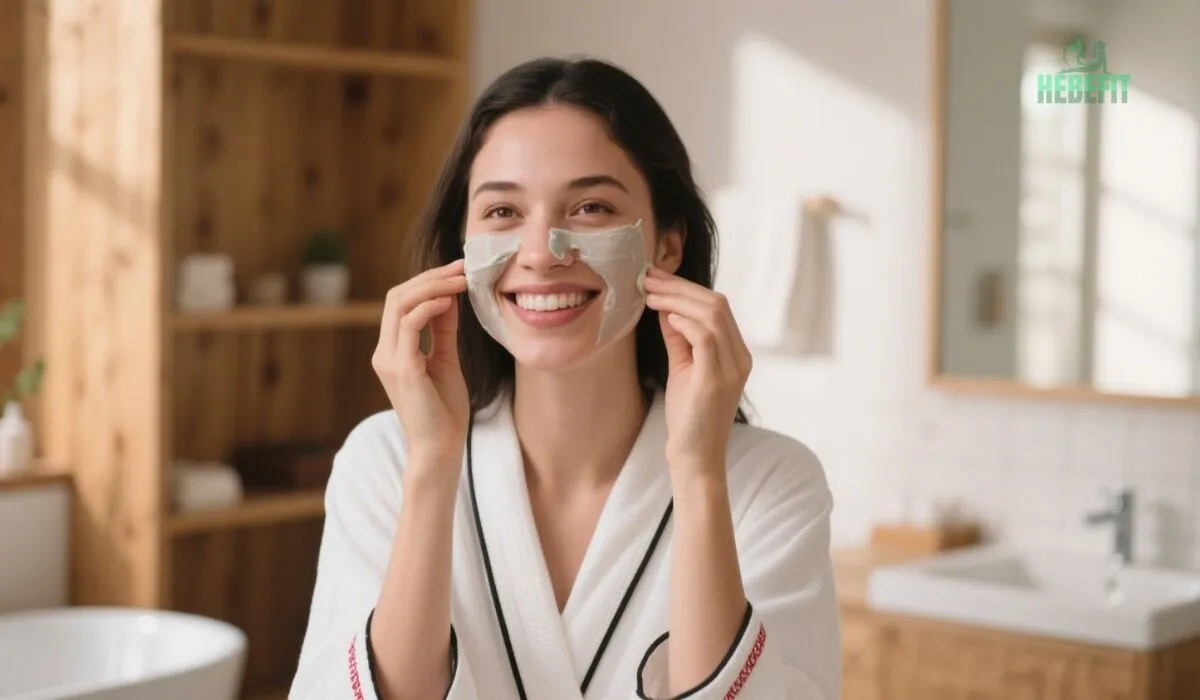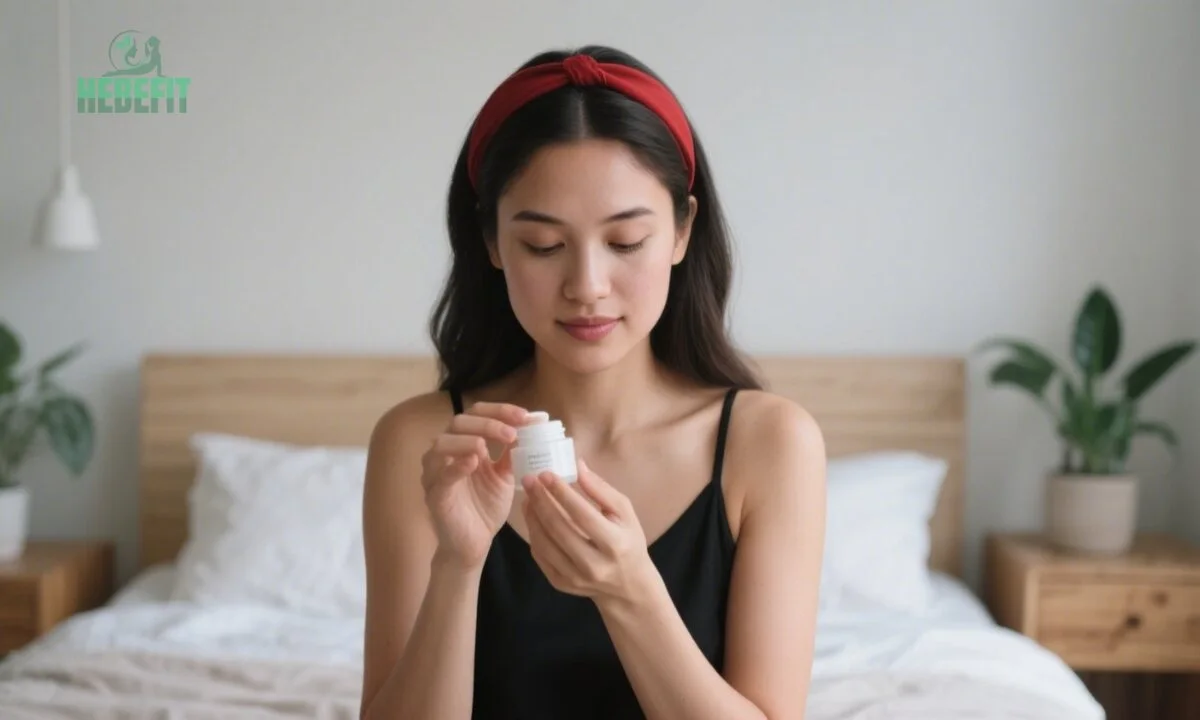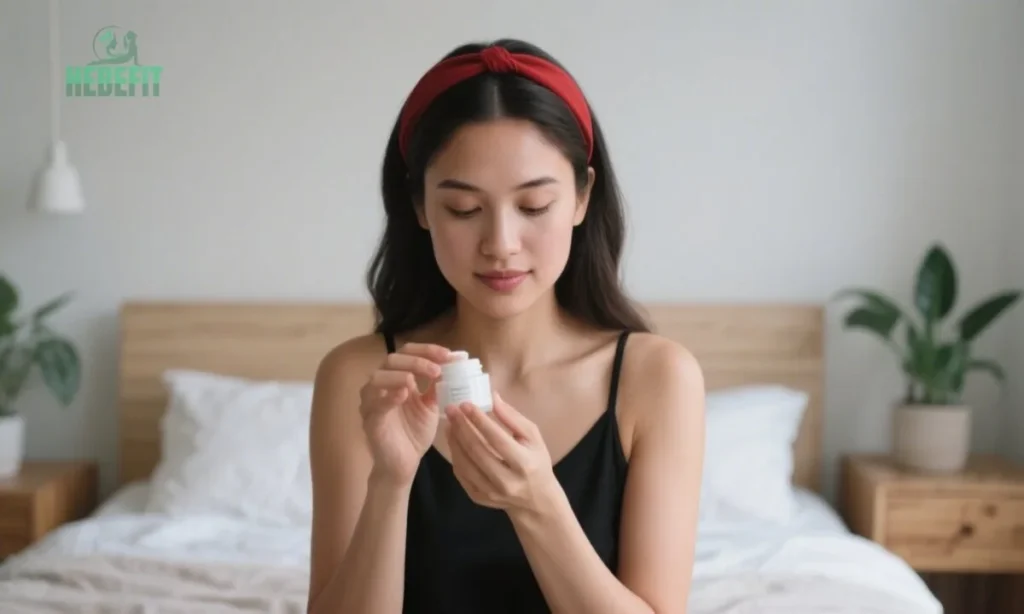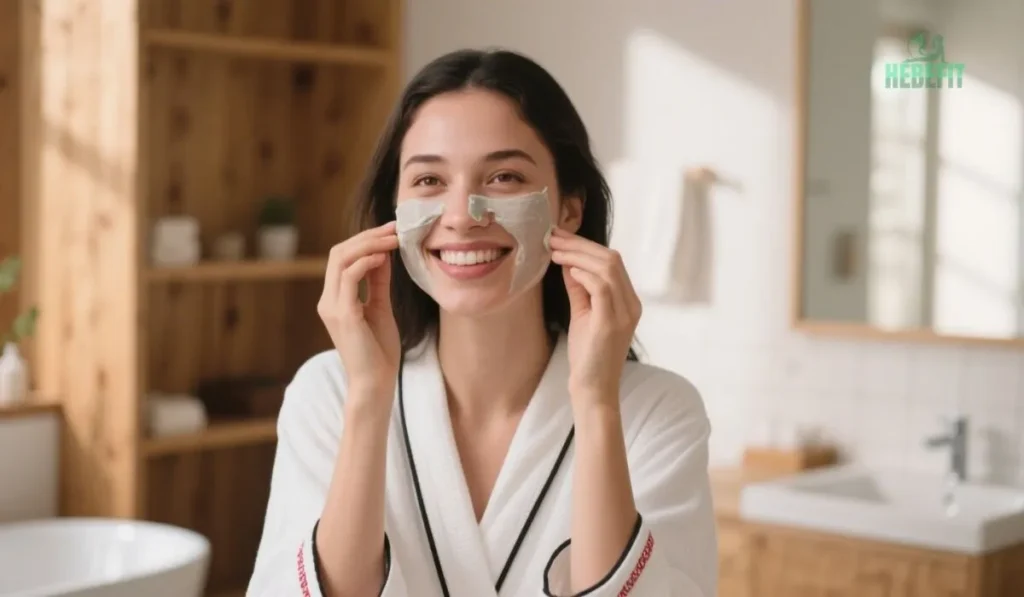Tired of scrolling through endless lists of skincare products packed with unpronounceable chemicals and hefty price tags? You’re not alone! Many are seeking a simpler, more wholesome approach, leading them straight to the wonders of the best natural skin care at home. If you would like to use natural methods for a glowing complexion, you’re on the right page. This detailed guide tells you not only what the best natural skin care at home means but also explains why it’s great for your skin and how to get started on a simple home routine. Learn the natural methods to help your skin look healthy and glowing.
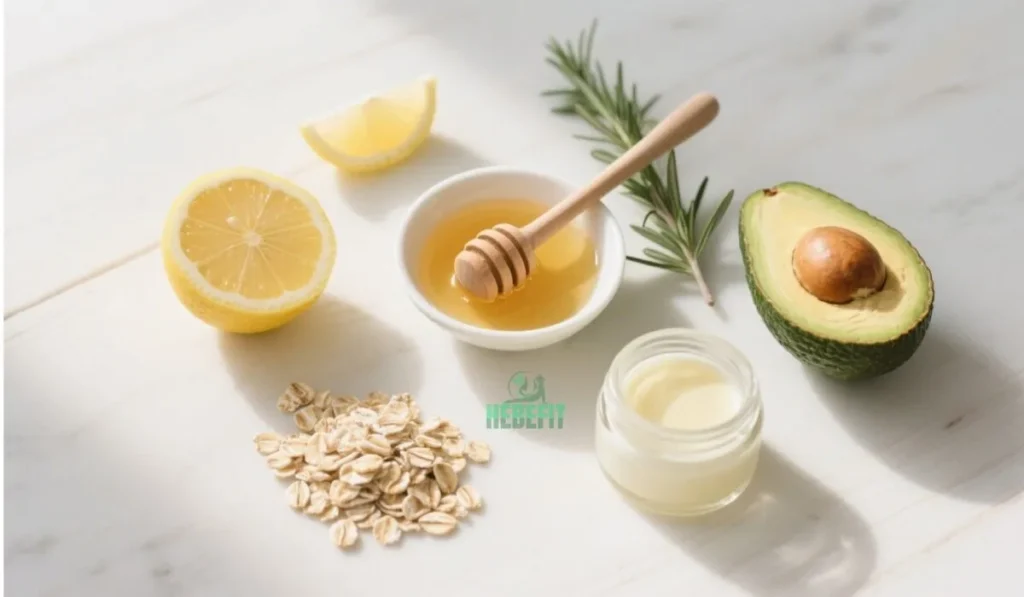
What Exactly is the “Best Natural Skin Care at Home”?
When we talk about the best natural skin care at home, we’re referring to skincare practices and products that utilize ingredients sourced directly from nature – think fruits, vegetables, herbs, oils and grains. These are often items you might already have in your kitchen or can easily find at a local grocery or health food store.
The “best” part is different for everyone’s skin, but generally, it means:
- Gentle & Nourishing: Free from harsh synthetic chemicals, artificial fragrances, parabens, sulfates, and other potential irritants.
- Effective: Leveraging the inherent beneficial properties of natural ingredients (vitamins, antioxidants, anti-inflammatory compounds) to address common skin concerns.
- Accessible & Affordable: Often more budget-friendly than high-end commercial products.
- Customizable: You can tailor recipes and routines specifically to your skin type and concerns.
It’s about embracing simplicity and trusting the potent goodness that nature provides. It’s skincare that feels good, does good, and is good for you.
Why Should You Care About Finding the Best Natural Skin Care at Home?
You might be wondering, “With so many products on the market, why bother with DIY?” The reasons are compelling, especially if you’re aiming for healthier skin and a more conscious lifestyle.
Escape the Chemical Maze
Our skin is our largest organ, and it absorbs what we put on it. Many conventional skincare products contain synthetic ingredients that can, over time, cause irritation, allergic reactions, or disrupt your skin’s natural balance. Natural skincare minimizes this risk, offering a purer alternative.
Budget-Friendly Beauty
Let’s be honest, high-quality skincare can be expensive! Natural ingredients are often incredibly affordable. An avocado, a bit of honey, or some oatmeal can provide amazing benefits without breaking the bank. This makes consistent, quality skincare accessible to more people.
Tailored to Your Unique Skin
Is your skin oily, dry, combination, sensitive, or acne-prone? With natural skincare, you become your own alchemist. You can pick and choose ingredients that specifically target your concerns.
* Oily skin? Clay and witch hazel can be your best friends.
* Dry skin? Avocado and shea butter offer deep hydration.
* Sensitive skin? Oats and chamomile are wonderfully soothing.
This level of personalization is often hard to find in off-the-shelf products.
Know Exactly What You’re Using
Transparency is key. When you make your own skincare, you have complete control over the ingredients. No more squinting at long, confusing labels! You know every single component going onto your skin.
Kinder to the Planet
Many natural ingredients are biodegradable, and opting for DIY can reduce packaging waste associated with commercial products. It’s a small but significant step towards a more sustainable beauty routine.
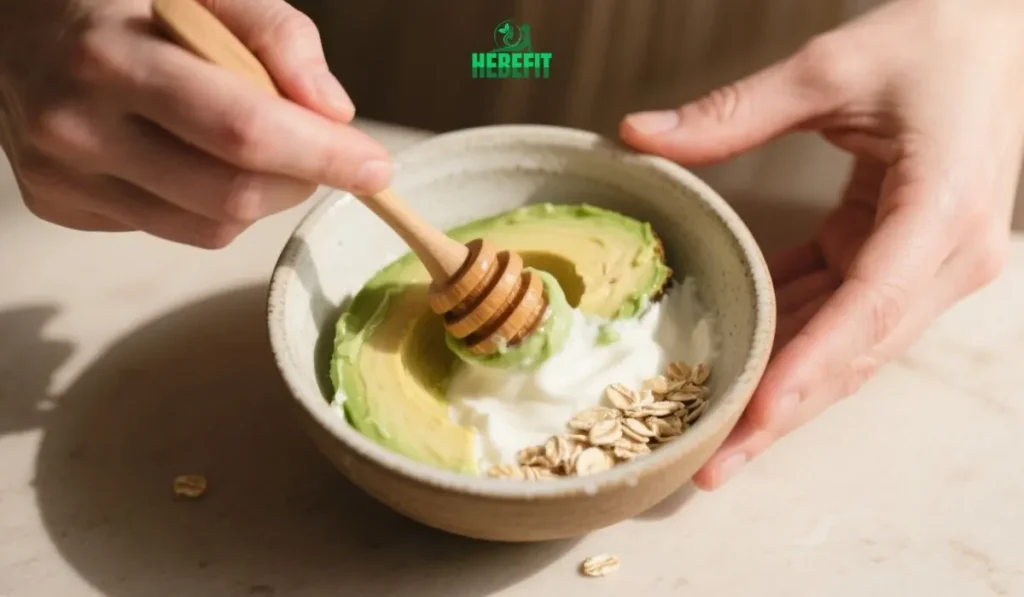
How to Do Step-by-Step Best Natural Skin Care at Home: A 7-Step Routine
Ready to dive in? Here’s a step-by-step guide to building your own natural skincare routine. Remember, consistency is key!
Step 1: Understand Your Skin Type
Before you start mixing, identify your skin type. This will guide your ingredient choices.
* Normal: Balanced, not too oily or dry.
* Dry: Feels tight, flaky, or rough.
* Oily: Shiny, greasy, prone to breakouts.
* Combination: Oily in some areas (usually T-zone), dry or normal in others.
* Sensitive: Reacts easily to new products, prone to redness or itching.
Pro-Tip: If unsure, observe your skin an hour after washing with a gentle cleanser – how does it look and feel?
Step 2: Gentle Cleansing (Morning & Evening)
Cleansing removes dirt, oil, and impurities without stripping your skin’s natural moisture.
* Honey: Antibacterial and hydrating. Simply massage a small amount onto damp skin and rinse. Excellent for most skin types, especially dry or acne-prone.
* Oatmeal: (Finely ground) Mixed with water to form a paste, it’s a gentle cleanser and exfoliant, especially for sensitive skin.
* Oil Cleansing: Yes, oil cleanses oil! Use castor oil (for oily skin) mixed with a carrier oil like jojoba, olive, or almond oil (for drier skin). Massage into dry skin, then wipe off with a warm, damp cloth.
Step 3: Natural Toning (Optional, After Cleansing)
Toners help restore skin’s pH balance, remove any last traces of cleanser, and prep skin for moisturizer.
* Rose Water: Hydrating and soothing, great for all skin types, especially sensitive or mature skin.
* Apple Cider Vinegar (ACV): Dilute 1 part ACV with 3-4 parts water. Clarifying and can help with acne. Always patch test first, as it can be strong.
* Green Tea: Brewed and cooled, it’s packed with antioxidants and is anti-inflammatory.
Step 4: Exfoliation (1-2 Times Per Week)
Exfoliating removes dead skin cells, revealing brighter, smoother skin underneath.
* Sugar Scrub: Mix brown or white sugar with a carrier oil (coconut, olive, almond) and a drop of essential oil (optional).
* Coffee Grounds: Great for invigorating the skin and can temporarily reduce a_ppearance of cellulite when used on the body._
* Oatmeal & Yogurt: A gentler option, mix finely ground oatmeal with plain yogurt for a soothing, exfoliating mask.
Step 5: Nourishing Face Masks (1-2 Times Per Week)
Masks provide a concentrated dose of beneficial ingredients.
* Avocado & Honey Mask: (For dry/mature skin) Mash 1/4 ripe avocado with 1 tsp honey.
* Bentonite Clay & ACV/Water Mask: (For oily/acne-prone skin) Mix clay with liquid to form a paste. Avoid metal utensils with bentonite clay.
* Yogurt & Turmeric Mask: (For brightening/anti-inflammatory) Mix plain yogurt with a pinch of turmeric. Be mindful, turmeric can stain!

Step 6: Hydrating Moisturization (Morning & Evening)
Moisturizing locks in hydration and protects the skin barrier.
* Natural Oils:
* Jojoba Oil: Similar to skin’s natural sebum, great for all skin types.
* Rosehip Seed Oil: Rich in Vitamin A, excellent for anti-aging and scars.
* Coconut Oil: Very hydrating but can be comedogenic for some (clog pores). Best for body or very dry facial skin.
* Argan Oil: Lightweight and nourishing.
* Shea Butter or Cocoa Butter: Richer options for very dry skin or for nighttime use.
* Aloe Vera Gel: Lightweight, soothing, and hydrating, especially good for oily or irritated skin.
A little goes a long way with natural oils! Start with just a few drops. For more on the best oils, you might want to check out our deep-dive article on carrier oils for skin health on Hebefit.com!
Step 7: Sun Protection (Every Morning – CRUCIAL)
While many natural ingredients offer some antioxidant protection, the most crucial step for any skincare routine, natural or not, is sun protection. UV rays are the primary cause of premature aging and skin damage.
* Seek Shade & Protective Clothing: Especially during peak sun hours (10 am – 4 pm).
* Mineral Sunscreen: Look for sunscreens with zinc oxide or titanium dioxide as active ingredients. These are physical blockers and generally considered more “natural” than chemical sunscreens. This is one area where a well-formulated commercial product is usually recommended for reliable SPF.
Star Natural Ingredients & Their Superpowers
| Ingredient | Key Benefit(s) | Best For Skin Types | Notes |
| Honey (Raw) | Antibacterial, Antiseptic, Humectant, Healing | All, especially Acne-Prone, Dry | Use raw, unpasteurized for maximum benefits |
| Oatmeal (Colloidal) | Soothing, Anti-inflammatory, Gentle Cleansing | Sensitive, Irritated, Eczema-Prone | Finely ground works best |
| Avocado | Rich in Fatty Acids, Vitamins E & C, Hydrating | Dry, Mature, Dehydrated | Use ripe avocado |
| Coconut Oil | Deeply Moisturizing, Antibacterial | Very Dry (Face – patch test), Body | Can be comedogenic for some face types |
| Jojoba Oil | Mimics Sebum, Balancing, Moisturizing | All, especially Oily, Combination | Non-comedogenic for most |
| Apple Cider Vinegar | Astringent, pH Balancing, Anti-acne | Oily, Acne-Prone | Always dilute, patch test |
| Green Tea | Antioxidant, Anti-inflammatory, Soothing | All, especially Sensitive, Mature | Use cooled, brewed tea |
| Aloe Vera Gel | Hydrating, Soothing, Healing | All, especially Sunburned, Irritated | Use pure gel if possible |
| Bentonite Clay | Detoxifying, Oil-Absorbing, Tightening | Oily, Congested, Acne-Prone | Don’t use metal bowls/spoons |
Sample Weekly Natural Skincare Schedule
| Day | Morning Routine | Evening Routine | Weekly Treat(s) |
| Monday | Honey Cleanse, Rose Water Toner, Jojoba Oil Moisturizer, SPF | Oil Cleanse, Rose Water Toner, Rosehip Seed Oil | |
| Tuesday | Honey Cleanse, Rose Water Toner, Jojoba Oil Moisturizer, SPF | Oil Cleanse, Rose Water Toner, Rosehip Seed Oil | Exfoliate: Sugar & Coconut Oil Scrub |
| Wednesday | Honey Cleanse, Rose Water Toner, Jojoba Oil Moisturizer, SPF | Oil Cleanse, Rose Water Toner, Rosehip Seed Oil | |
| Thursday | Honey Cleanse, Rose Water Toner, Jojoba Oil Moisturizer, SPF | Oil Cleanse, Rose Water Toner, Rosehip Seed Oil | Face Mask: Avocado & Honey Mask |
| Friday | Honey Cleanse, Rose Water Toner, Jojoba Oil Moisturizer, SPF | Oil Cleanse, Rose Water Toner, Rosehip Seed Oil | |
| Saturday | Honey Cleanse, Rose Water Toner, Jojoba Oil Moisturizer, SPF | Oil Cleanse, Rose Water Toner, Rosehip Seed Oil | Exfoliate: Oatmeal & Yogurt Scrub |
| Sunday | Honey Cleanse, Rose Water Toner, Jojoba Oil Moisturizer, SPF | Oil Cleanse, Rose Water Toner, Rosehip Seed Oil | Face Mask: Clay Mask (if needed) |
Note: This is a sample. Adjust based on your skin’s response and needs. Listen to your skin!
Final Thoughts: Embrace Your Natural Beauty Journey
Embarking on a journey with the best natural skin care at home is about more than just clear skin; it’s a delightful act of self-care. It’s empowering to know exactly what you’re putting on your skin and to create remedies that are perfectly suited to you.
Start simple. You don’t need to overhaul everything at once. Pick one or two recipes to try, see how your skin responds, and gradually build your routine. The most important things are to be consistent, patient, and to enjoy the process of nurturing your skin with the goodness of nature. Your skin (and your wallet!) will thank you.
We hope this guide helps you discover the incredible benefits and joy of natural skincare. What are your favorite natural skincare ingredients or recipes? Share your thoughts and experiences in the comments below – we’d love to hear from our Hebefit community in the USA and Canada!
FAQs: Your Natural Skincare Questions Answered
When should I include every step of a natural skincare routine?
Both cleansing and moisturizing your skin should happen twice a day, once in the morning and once in the evening. Most people find that they only need to exfoliate and use masks no more than 1 to 2 times a week, based on their skin type. Be sure to put on SPF in the morning every day.
Do natural skin products sometimes bring on skin irritation or allergies for people?
There are cases where people react to natural ingredients. Prior to applying any new ingredient or recipe at once to your face, first do a patch test. Put a gentle dot on the inside of your arm or behind each ear and wait 24 to 48 hours to look for signs of irritation.
How much time do people need to wait to see any improvements from natural skincare?
The outcome depends on your skin’s type, what you want to address and how often you use it. Quick results such as hydration and calmness are some benefits some immediate experience. If you want your skin to clear up properly or become more even over time, stick with daily use for about 4-6 weeks which is how long it takes for all your old skin cells to shed.
What is the best way to keep my DIY natural skincare products?
Because preservatives are not used, DIY products usually won’t last for long. Keep water-based products such as tea toners or fresh fruit masks, sealed in airtight jars in the fridge and apply them within a few days to one week. These mixtures will last longer if they are kept in a cold, dark spot. It’s better to work with small portions instead of a large batch.
Do natural products work as well as commercial skincare products?
The strong vitamins and antioxidants present in such ingredients are what make them very effective. Still, how effective a product is may also depend on the particular concern and how thickly the ingredient is applied. For some specific issues, specialized products from commercial partners may be the best answer. G gentle, nourishing and preventative care is what natural skincare is best at.
How well will natural skincare work for people with acne-prone skin?
Absolutely! Tea tree oil (not pure), honey, witch hazel and clay masks are excellent options for people with acne, as they all combat bacteria, reduce swelling and smooth out oily skin. Remember to use oils that do not clog pores when you oil cleanse or apply moisturizer.
Which natural substances can help with anti-aging?
Make sure you choose foods that are full of antioxidants and vitamins. Rosehip seed oil, argan oil, green tea, pomegranate seed oil and mashed berries are all useful for mature skin or to stop premature aging.
Is there a place to buy quality, natural skincare ingredients?
Your local grocery store should carry items such as honey, oats, fruits and oils (you might choose organic if it’s offered). Great essentials for health food stores are pure aloe vera gel, a few types of carrier oils (jojoba, almond), essential oils and clays. Natural stores online provide many types of specialized ingredients for skincare.
